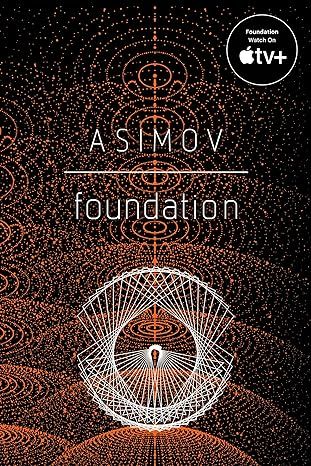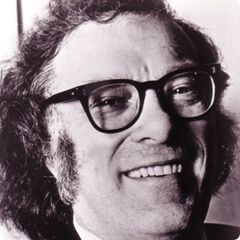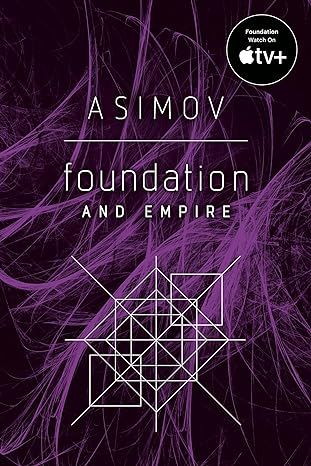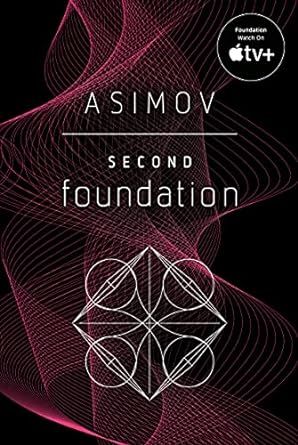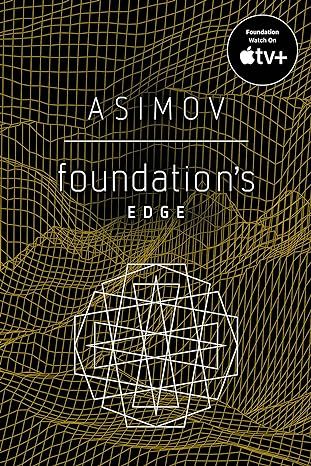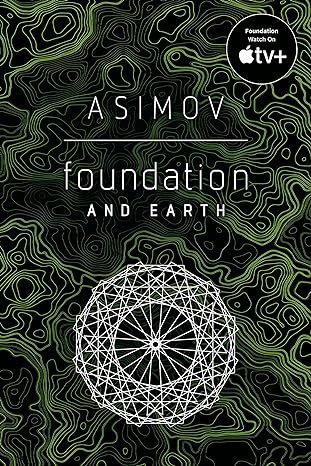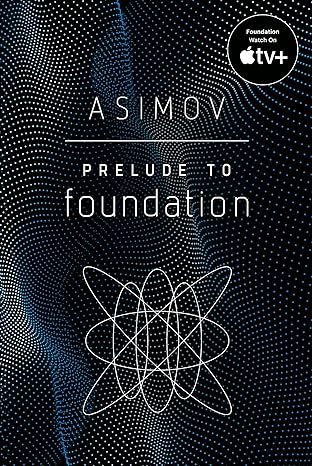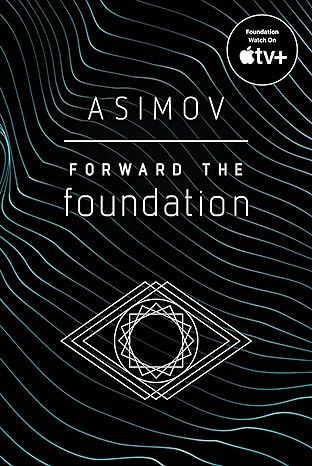Foundation
4.4
-
32,088 ratings
The first novel in Isaac Asimov’s classic science-fiction masterpiece, the Foundation series
THE EPIC SAGA THAT INSPIRED THE APPLE TV+ SERIES FOUNDATION • Nominated as one of America’s best-loved novels by PBS’s The Great American Read
For twelve thousand years the Galactic Empire has ruled supreme. Now it is dying. But only Hari Seldon, creator of the revolutionary science of psychohistory, can see into the future—to a dark age of ignorance, barbarism, and warfare that will last thirty thousand years. To preserve knowledge and save humankind, Seldon gathers the best minds in the Empire—both scientists and scholars—and brings them to a bleak planet at the edge of the galaxy to serve as a beacon of hope for future generations. He calls his sanctuary the Foundation.
The Foundation novels of Isaac Asimov are among the most influential in the history of science fiction, celebrated for their unique blend of breathtaking action, daring ideas, and extensive worldbuilding. In Foundation, Asimov has written a timely and timeless novel of the best—and worst—that lies in humanity, and the power of even a few courageous souls to shine a light in a universe of darkness.
Kindle
$8.99
Available instantly
Audiobook
$0.00
with membership trial
School & Library Binding
$18.80
Paperback
$11.39
Ships from
Amazon.com
Payment
Secure transaction
ISBN-10
0553382578
ISBN-13
978-0553382570
Print length
272 pages
Language
English
Publisher
Del Rey; Spectra
Publication date
April 28, 2008
Dimensions
5.49 x 0.54 x 8.25 inches
Item weight
7 ounces
Frequently bought together
Popular Highlights in this book
Never let your sense of morals prevent you from doing what is right!
Highlighted by 5,054 Kindle readers
It pays to be obvious, especially if you have a reputation for subtlety.
Highlighted by 4,962 Kindle readers
To succeed, planning alone is insufficient. One must improvise as well.
Highlighted by 4,462 Kindle readers
Product details
ASIN :
B000FC1PWA
File size :
3234 KB
Text-to-speech :
Enabled
Screen reader :
Supported
Enhanced typesetting :
Enabled
X-Ray :
Enabled
Word wise :
Enabled
Editorial Reviews
Praise for Isaac Asimov and his Foundation series
“A true polymath, a superb rationalist, an exciting and accessible writer in both fiction and nonfiction, Isaac Asimov was simply a master of all he surveyed.”—Greg Bear
“Asimov served wondrous meals-of-the-mind to a civilization that was starved for clear thinking about the future. To this day, his visions spice our ongoing dinner-table conversation about human destiny.”—David Brin
“Isaac was still in his teens when I met him, a fan of mine before I was a fan of his. Writing for John W. Campbell back in the famous ‘golden age of science fiction,’ he became one of the founders of our field. With the Robot stories and the Foundation stories, he helped to shape science fiction as we know it.”—Jack Williamson
“I grew up on the ABC’s of science fiction—Asimov, Bradbury, Clarke. There’s a reason Asimov’s name comes first, and not just because of the alphabet!”—Janis Ian
“With his fertile imagination, his wit, and his prolific output, Isaac Asimov truly laid the foundation for all future generations of science fiction writers.”—Kevin J. Anderson
“If anything can be said to have been the launch pad for space-age science fiction, it has to be the Foundation trilogy. It’s a classic. And it’s unforgettable.”—Jack McDevitt
“The Foundation series is one of the masterpieces of science fiction. If you’ve never read these novels, then you’re in for a treat, and even if you’ve already read them, then you owe it to yourself to reread them, because they’re still great.”—Allen Steele
“Quite simply, Asimov got me started.”—Liz Williams
“Asimov’s Foundation trilogy was the pivotal touchstone of my life in creative fiction. His vision and scope spanned the galaxy across eons, and at the same time he told deeply personal stories of living characters. The writer I am sprang from the boy that these books touched back then. They continue to move me still. Thank you, Isaac, for opening my mind and my life to the possible.”—Tracy Hickman
“I’m sure there will be more Foundation stories, and more robot stories, and more science-fictional mysteries, because those are Isaac’s legacies to us. But reading them won’t be quite the same. There was only one Isaac Asimov; there will never be another.”—Mike Resnick
Sample
HARI SELDON—. . . born in the 11,988th year of the Galactic Era; died 12,069. The dates are more commonly given in terms of the current Foundational Era as -79 to the year 1 F.E. Born to middle-class parents on Helicon, Arcturus sector (where his father, in a legend of doubtful authenticity, was a tobacco grower in the hydroponic plants of the planet), he early showed amazing ability in mathematics. Anecdotes concerning his ability are innumerable, and some are contradictory. At the age of two, he is said to have . . .
. . . Undoubtedly his greatest contributions were in the field of psychohistory. Seldon found the field little more than a set of vague axioms; he left it a profound statistical science. . . .
. . . The best existing authority we have for the details of his life is the biography written by Gaal Dornick who, as a young man, met Seldon two years before the great mathematician's death. The story of the meeting . . .
ENCYCLOPEDIA GALACTICA
Chapter One
His name was Gaal Dornick and he was just a country boy who had never seen Trantor before. That is, not in real life. He had seen it many times on the hyper-video, and occasionally in tremendous three-dimensional newscasts covering an Imperial Coronation or the opening of a Galactic Council. Even though he had lived all his life on the world of Synnax, which circled a star at the edges of the Blue Drift, he was not cut off from civilization, you see. At that time, no place in the Galaxy was.
There were nearly twenty-five million inhabited planets in the Galaxy then, and not one but owed allegiance to the Empire whose seat was on Trantor. It was the last half-century in which that could be said.
To Gaal, this trip was the undoubted climax of his young, scholarly life. He had been in space before so that the trip, as a voyage and nothing more, meant little to him. To be sure, he had traveled previously only as far as Synnax's only satellite in order to get the data on the mechanics of meteor driftage which he needed for his dissertation, but space-travel was all one whether one travelled half a million miles, or as many light years.
He had steeled himself just a little for the Jump through hyper-space, a phenomenon one did not experience in simple interplanetary trips. The Jump remained, and would probably remain forever, the only practical method of travelling between the stars. Travel through ordinary space could proceed at no rate more rapid than that of ordinary light (a bit of scientific knowledge that belonged among the items known since the forgotten dawn of human history), and that would have meant years of travel between even the nearest of inhabited systems. Through hyper-space, that unimaginable region that was neither space nor time, matter nor energy, something nor nothing, one could traverse the length of the Galaxy in the interval between two neighboring instants of time.
Gaal had waited for the first of those jumps with a little dread curled gently in his stomach, and it ended in nothing more than a trifling jar, a little internal kick which ceased an instant before he could be sure he had felt it. That was all.
And after that, there was only the ship, large and glistening; the cool production of 12,000 years of Imperial progress; and himself, with his doctorate in mathematics freshly obtained and an invitation from the great Hari Seldon to come to Trantor and join the vast and somewhat mysterious Seldon Project.
What Gaal was waiting for after the disappointment of the Jump was that first sight of Trantor. He haunted the View-room. The steel shutter-lids were rolled back at announced times and he was always there, watching the hard brilliance of the stars, enjoying the incredible hazy swarm of a star cluster, like a giant conglomeration of fireflies caught in mid-motion and stilled forever. At one time there was the cold, blue-white smoke of a gaseous nebula within five light years of the ship, spreading over the window like distant milk, filling the room with an icy tinge, and disappearing out of sight two hours later, after another Jump.
The first sight of Trantor's sun was that of a hard, white speck all but lost in a myriad such, and recognizable only because it was pointed out by the ship's guide. The stars were thick here near the Galactic center. But with each Jump, it shone more brightly, drowning out the rest, paling them and thinning them out.
An officer came through and said, "View-room will be closed for the remainder of the trip. Prepare for landing."
Gaal had followed after, clutching at the sleeve of the white uniform with the Spaceship-and-Sun of the Empire on it.
He said, "Would it be possible to let me stay? I would like to see Trantor."
The officer smiled and Gaal flushed a bit. It occurred to him that he spoke with a provincial accent.
The officer said, "We'll be landing on Trantor by morning."
"I mean I want to see it from Space."
"Oh. Sorry, my boy. If this were a space-yacht we might manage it. But we're spinning down, sun-side. You wouldn't want to be blinded, burnt, and radiation-scarred all at the same time, would you?"
Gaal started to walk away.
The officer called after him, "Trantor would only be a gray blur anyway, Kid. Why don't you take a space-tour once you hit Trantor. They're cheap."
Gaal looked back, "Thank you very much."
It was childish to feel disappointed, but childishness comes almost as naturally to a man as to a child, and there was a lump in Gaal's throat. He had never seen Trantor spread out in all its incredibility, as large as life, and he hadn't expected to have to wait longer.
Chapter Two
The ship landed in a medley of noises. There was the far-off hiss of the atmosphere cutting and sliding past the metal of the ship. There was the steady drone of the conditioners fighting the heat of friction, and the slower rumble of the engines enforcing deceleration. There was the human sound of men and women gathering in the debarkation rooms and the grind of the hoists lifting baggage, mail, and freight to the long axis of the ship, from which they would be later moved along to the unloading platform.
Gaal felt the slight jar that indicated the ship no longer had an independent motion of its own. Ship's gravity had been giving way to planetary gravity for hours. Thousands of passengers had been sitting patiently in the debarkation rooms which swung easily on yielding force-fields to accommodate its orientation to the changing direction of the gravitational forces. Now they were crawling down curving ramps to the large, yawning locks.
Gaal's baggage was minor. He stood at a desk, as it was quickly and expertly taken apart and put together again. His visa was inspected and stamped. He himself paid no attention.
This was Trantor! The air seemed a little thicker here, the gravity a bit greater, than on his home planet of Synnax, but he would get used to that. He wondered if he would get used to immensity.
Debarkation Building was tremendous. The roof was almost lost in the heights. Gaal could almost imagine that clouds could form beneath its immensity. He could see no opposite wall; just men and desks and coverging floor till it faded out in haze.
The man at the desk was speaking again. He sounded annoyed. He said, "Move on, Dornick." He had to open the visa, look again, before he remembered the name.
Gaal said, "Where—where—"
The man at the desk jerked a thumb, "Taxis to the right and third left."
Gaal moved, seeing the glowing twists of air suspended high in nothingness and reading, "TAXIS TO ALL POINTS."
A figure detached itself from anonymity and stopped at the desk, as Gaal left. The man at the desk looked up and nodded briefly. The figure nodded in return and followed the young immigrant.
He was in time to hear Gaal's destination.
Gaal found himself hard against a railing.
The small sign said, "Supervisor." The man to whom the sign referred did not look up. He said, "Where to?"
Gaal wasn't sure, but even a few seconds hesitation meant men queuing in line behind him.
The Supervisor looked up, "Where to?"
Gaal's funds were low, but there was only this one night and then he would have a job. He tried to sound nonchalant: "A good hotel, please."
The Supervisor was unimpressed. "They're all good. Name one."
Gaal said, desperately, "The nearest one, please."
The Supervisor touched a button. A thin line of light formed along the floor, twisting among others which brightened and dimmed in different colors and shades. A ticket was shoved into Gaal's hands. It glowed faintly.
The Supervisor said, "One point twelve."
Gaal fumbled for the coins. He said, "Where do I go?"
"Follow the light. The ticket will keep glowing as long as you're pointed in the right direction."
Gaal looked up and began walking. There were hundreds creeping across the vast floor, following their individual trails, sifting and straining themselves through intersection points to arrive at their respective destinations.
His own trail ended. A man in glaring blue and yellow uniform, shining and new in unstainable plastotextile, reached for his two bags.
"Direct line to the Luxor," he said.
The man who followed Gaal heard that. He also heard Gaal say, "Fine," and watched him enter the blunt-nosed vehicle.
The taxi lifted straight up. Gaal stared out the curved, transparent window, marvelling at the sensation of airflight within an enclosed structure and clutching instinctively at the back of the driver's seat. The vastness contracted and the people became ants in random distribution. The scene contracted further and began to slide backward.
There was a wall ahead. It began high in the air and extended upward out of sight. It was riddled with holes that were the mouths of tunnels. Gaal's taxi moved toward one, then plunged into it. For a moment, Gaal wondered idly how his driver could pick out one among so many.
There was now only blackness, with nothing but the past-flashing of a colored signal light to relieve the gloom. The air was full of a rushing sound.
Gaal leaned forward against deceleration then and the taxi popped out of the tunnel and descended to ground-level once more.
"The Luxor Hotel," said the driver, unnecessarily. He helped Gaal with his baggage, accepted a tenth-credit tip with a businesslike air, picked up a waiting passenger, and was rising again.
In all this, from the moment of debarkation, there had been no glimpse of sky.
Read more
About the authors
Isaac Asimov
Isaac Asimov was an American author and professor of biochemistry at Boston University, best known for his works of science fiction and for his popular science books. Asimov was prolific and wrote or edited more than 500 books and an estimated 90,000 letters and postcards. His books have been published in 9 of the 10 major categories of the Dewey Decimal Classification.
Asimov wrote hard science fiction and, along with Robert A. Heinlein and Arthur C. Clarke, he was considered one of the "Big Three" science fiction writers during his lifetime. Asimov's most famous work is the Foundation Series; his other major series are the Galactic Empire series and the Robot series. The Galactic Empire novels are explicitly set in earlier history of the same fictional universe as the Foundation series. Later, beginning with Foundation's Edge, he linked this distant future to the Robot and Spacer stories, creating a unified "future history" for his stories much like those pioneered by Robert A. Heinlein and previously produced by Cordwainer Smith and Poul Anderson. He wrote hundreds of short stories, including the social science fiction "Nightfall", which in 1964 was voted by the Science Fiction Writers of America the best short science fiction story of all time. Asimov wrote the Lucky Starr series of juvenile science-fiction novels using the pen name Paul French.
Read more
Reviews
Customer reviews
4.4 out of 5
32,088 global ratings
Hibiscus Pizza
5
Dated, Yet Relevant
Reviewed in the United States on May 29, 2024
Verified Purchase
I enjoyed the central premise of the book, in many ways it chronicles the fall of Rome, and in other ways it gives hope to humanity's future.
Matthew Meinholz
5
Love this series!
Reviewed in the United States on May 15, 2024
Verified Purchase
First dive into reading the Foundation series. Wonderful series and writer.
Brian Graham
5
Arrived in great shape
Reviewed in the United States on May 7, 2024
Verified Purchase
Nice to replace my lost books and read them again.
Kindle Customer
4
Not quite what I remember
Reviewed in the United States on May 28, 2024
Verified Purchase
I just finished reading this book, having read it years (many years) ago. It seemed to be a lot longer the first time I read it. I enjoyed reading it a second time but it really did not seem to be as impressive as it did years ago. It's kind of scary that this was published in the early fifties and it had a storyline about a politician putting a political rival on trial for a bogus crime and not caring if there was a conviction or not as long as the trial disgraced the rival. I am going to move on to book two and looking forward to it. Hope I'm not disappointed. I really recall Hardin having a much bigger role.
Read more
Kindle Customer
3
Doesn't Age Well
Reviewed in the United States on May 2, 2024
Verified Purchase
For it's era, it has impressive qualities. Reading it in 2024 is a chore. There is exactly one woman in this book, a nagging princess housewife. Characters are queer coded for ridicule and humor that falls flat. In the Hari Seldon broad strokes sense, this book works. The details were a slog to force myself through. The Apple Adaptation commendably took the strengths and riffed into a far more interesting story.
Read more
Top Isaac Asimov titles
Best Sellers

The Great Alone: A Novel
4.6
-
152,447
$5.49

The Four Winds
4.6
-
156,242
$9.99

Winter Garden
4.6
-
72,838
$7.37

The Nightingale: A Novel
4.7
-
309,637
$8.61

Steve Jobs
4.7
-
24,596
$1.78

Iron Flame (The Empyrean, 2)
4.6
-
164,732
$14.99

A Court of Thorns and Roses Paperback Box Set (5 books) (A Court of Thorns and Roses, 9)
4.8
-
26,559
$37.99

Pretty Girls: A Novel
4.3
-
88,539
$3.67

The Bad Weather Friend
4.1
-
34,750
$12.78

Pucking Around: A Why Choose Hockey Romance (Jacksonville Rays Hockey)
4.3
-
41,599
$14.84

Start with Why: How Great Leaders Inspire Everyone to Take Action
4.6
-
37,152
$9.99

Tomorrow, and Tomorrow, and Tomorrow: A novel
4.4
-
95,875
$13.99

Weyward: A Novel
4.4
-
27,652
$11.99

Tom Lake: A Reese's Book Club Pick
4.3
-
37,302
$15.74

All the Sinners Bleed: A Novel
4.4
-
12,894
$13.55

The Mystery Guest: A Maid Novel (Molly the Maid)
4.3
-
9,844
$14.99

Bright Young Women: A Novel
4.2
-
8,485
$14.99

The Wager: A Tale of Shipwreck, Mutiny and Murder (Random House Large Print)
4.5
-
28,672
$14.99

Hello Beautiful (Oprah's Book Club): A Novel (Random House Large Print)
4.4
-
79,390
$14.99

Small Mercies: A Detective Mystery
4.5
-
16,923
$10.00

Holly
4.5
-
31,521
$14.99

The Covenant of Water (Oprah's Book Club)
4.6
-
69,712
$9.24

Wellness: A novel
4.1
-
3,708
$14.99

The Art Thief: A True Story of Love, Crime, and a Dangerous Obsession
4.3
-
4,805
$14.99

The Berry Pickers: A Novel
4.5
-
14,209
$14.99
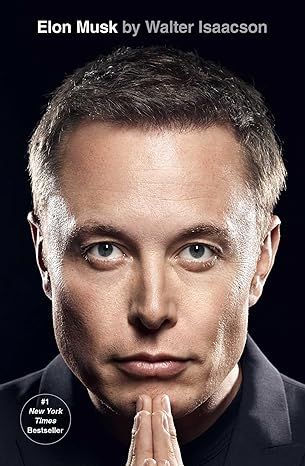
Elon Musk
4.7
-
15,272
$16.99

Just for the Summer
4.6
-
19,524
$11.99
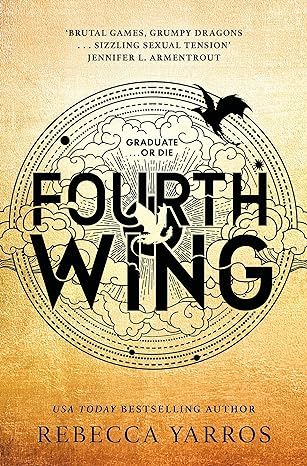
Fourth Wing (International Edition)
4.8
-
206,495
$7.95
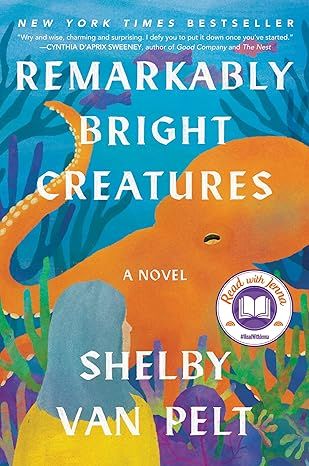
Remarkably Bright Creatures: A Read with Jenna Pick
4.6
-
65,556
$15.80

Tell Me Your Life Story, Mom: A Mother’s Guided Journal and Memory Keepsake Book (Tell Me Your Life Story® Series Books)
4.7
-
5,107
$11.24
